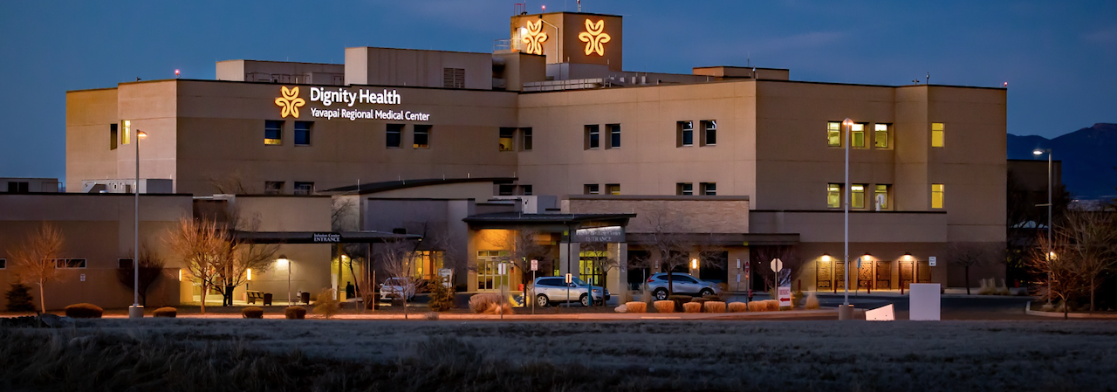Yavapai Regional Medical Center West
1003 Willow Creek Road
Prescott, AZ 86301
928.771.5100

Yavapai Regional Medical Center
Emergency Services
Dignity Health Yavapai Regional Medical Center provides 24/7 emergency care at two locations: Yavapai Regional West (Prescott) and Yavapai Regional East (Prescott Valley). Skilled medical teams treat patients of all ages for a wide range of illnesses and injuries, from critical emergencies to less serious conditions.

1003 Willow Creek Road
Prescott, AZ 86301
928.771.5100

7700 East Florentine Road
Prescott Valley, AZ 86314
928.442.8100
Yavapai Regional offers both ERAdvisor for patients and families to receive updates on their mobile phone, and CareAdvisor to get 24/7 updates on your patient journey.
Chest pain, a fall, injuries from a car crash—people seek care at Yavapai Regional’s Emergency Departments for many reasons. Our skilled team works together to stabilize, diagnose, and treat every patient. To do this, your Emergency Department physician may order tests (blood work, xrays, or an MRI, for example). Depending on the physician’s evaluation, you may be:
ERAdvisor keeps patients and their families updated on their progress while visiting either Yavapai Regional Emergency Department. To get started, provide your cell phone number to a member of the Emergency Department registration team. There’s no sign-up required or app to download. ERAdvisor allows patients and their loved ones to:
The nurses at both Yavapai Regional Emergency Departments use their extensive experience as well as national criteria to categorize patients as either “Emergency” or “Fast Track.” Patients with sore throats, rashes, or relatively minor injuries typically qualify as Fast Track. People with more complicated or serious problems are considered Emergency patients. Fast-Track patients are treated as quickly as possible by a specifically designated team. All patients are “triaged” to allow people in greatest need of medical attention to be seen first.
Yavapai Regional Medical Center is a Safe Haven provider as designated by Arizona’s Safe Haven Law. Created to keep new babies safe and healthy under any and all circumstances, a Safe Haven newborn is an unharmed infant – 72 days old or younger – who is delivered by a parent, or agent of the parent, to a Safe Haven provider, like Yavapai Regional. The parent or parent’s agent may remain anonymous and are not required to answer any questions.
As a Level IV Trauma Center, Yavapai Regional’s Emergency Department teams work with the Arizona Department of Health Services (ADHS) to support Arizona’s statewide trauma system. For example, patients with head injuries, multiple fractures, and other injuries may be transported to Yavapai Regional’s Emergency Department. Depending on their medical needs, patients may continue their care at Yavapai Regional or another facility. Yavapai Regional’s Emergency Departments oversee all patient transfers to ensure a safe transition of care.
The Emergency Department at Yavapai Regional West in Prescott serves as the area’s “emergency base hospital.” This means emergency medical technicians (also called first responders) in the field follow medical protocols developed by our Emergency Department physicians and nurses. First responders in the field also contact physicians and charge nurses from our Emergency Department for in-field consultations.
If you have any of the following symptoms, call 911 immediately or go to the closest emergency room:
Call 911 immediately or take your child directly to the closest E.R. if he or she has any of the symptoms listed above or any of the following: